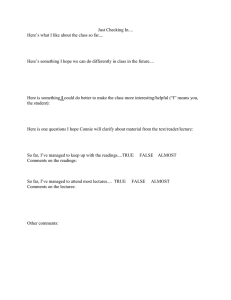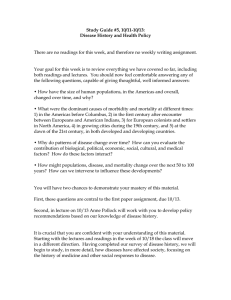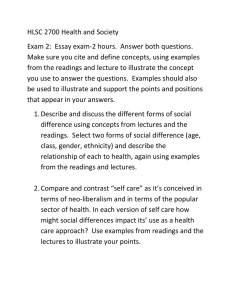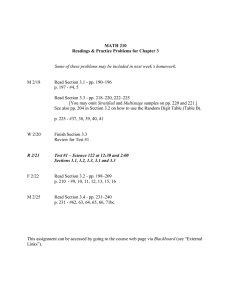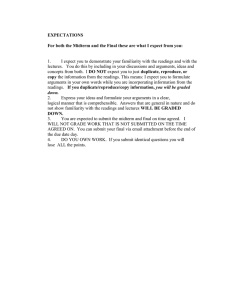THE UNITED STATES CONSTITUTION
advertisement
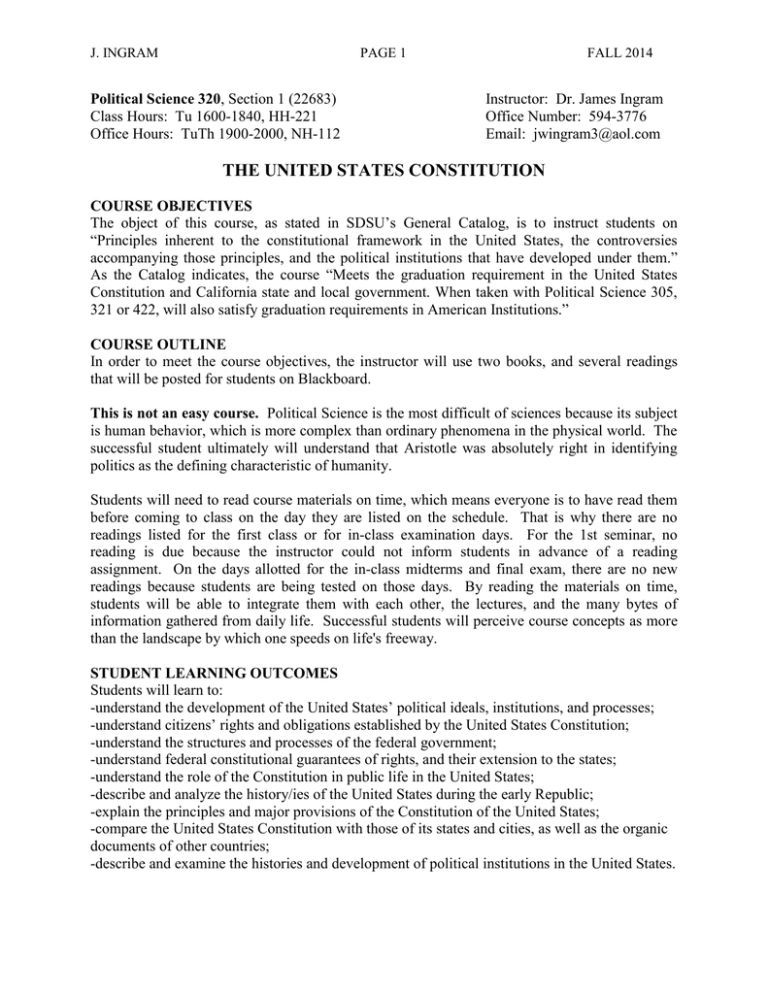
J. INGRAM PAGE 1 Political Science 320, Section 1 (22683) Class Hours: Tu 1600-1840, HH-221 Office Hours: TuTh 1900-2000, NH-112 FALL 2014 Instructor: Dr. James Ingram Office Number: 594-3776 Email: jwingram3@aol.com THE UNITED STATES CONSTITUTION COURSE OBJECTIVES The object of this course, as stated in SDSU’s General Catalog, is to instruct students on “Principles inherent to the constitutional framework in the United States, the controversies accompanying those principles, and the political institutions that have developed under them.” As the Catalog indicates, the course “Meets the graduation requirement in the United States Constitution and California state and local government. When taken with Political Science 305, 321 or 422, will also satisfy graduation requirements in American Institutions.” COURSE OUTLINE In order to meet the course objectives, the instructor will use two books, and several readings that will be posted for students on Blackboard. This is not an easy course. Political Science is the most difficult of sciences because its subject is human behavior, which is more complex than ordinary phenomena in the physical world. The successful student ultimately will understand that Aristotle was absolutely right in identifying politics as the defining characteristic of humanity. Students will need to read course materials on time, which means everyone is to have read them before coming to class on the day they are listed on the schedule. That is why there are no readings listed for the first class or for in-class examination days. For the 1st seminar, no reading is due because the instructor could not inform students in advance of a reading assignment. On the days allotted for the in-class midterms and final exam, there are no new readings because students are being tested on those days. By reading the materials on time, students will be able to integrate them with each other, the lectures, and the many bytes of information gathered from daily life. Successful students will perceive course concepts as more than the landscape by which one speeds on life's freeway. STUDENT LEARNING OUTCOMES Students will learn to: -understand the development of the United States’ political ideals, institutions, and processes; -understand citizens’ rights and obligations established by the United States Constitution; -understand the structures and processes of the federal government; -understand federal constitutional guarantees of rights, and their extension to the states; -understand the role of the Constitution in public life in the United States; -describe and analyze the history/ies of the United States during the early Republic; -explain the principles and major provisions of the Constitution of the United States; -compare the United States Constitution with those of its states and cities, as well as the organic documents of other countries; -describe and examine the histories and development of political institutions in the United States. J. INGRAM PAGE 2 FALL 2014 COURSE REQUIREMENTS Your course grade will be based on two midterm exams, a final, and participation. Each examination will consist of two parts, one multiple-choice and one written, with each of these components worth 15% of the course grade. Thus, the first midterm, second midterm and final exam will each be worth 30% of the course grade. The participation component will comprise the remaining 10% of your course grade. Both the multiple-choice and written components of your three exams will be drawn from a study guide posted in advance. You must take examinations using an 882 type Scantron and a number 2 pencil, as well as a pen. The final examination will be comprehensive. There is no extra credit for this class. However, I will award 10% of the points for the course based on attendance and participation. I will be giving pop quizzes, doing lectures and showing films during class time. Periodically, I will take attendance, and if you are not in class, you will be penalized. I will also use this 10% as a way to address unsatisfactory conduct, which includes disrupting class through early departures and late arrivals, as well as undesirable noise caused by students chattering with one another during my lectures. In addition to this 10%, class participation usually benefits students in other course components, such as exams and the essay. Some of the course participation may be submitted through Turnitin to ensure that students avoid academic dishonesty. “Students agree that by taking this course all required papers may be subject to submission for textual similarity review to Turnitin for the detection of plagiarism. All submitted papers will be included as source documents in the Turnitin reference database solely for the purpose of detecting plagiarism of such papers. You may submit your papers in such a way that no identifying information about you is included. Another option is that you may request, in writing, that your papers not be submitted to Turnitin. However, if you choose this option you will be required to provide documentation to substantiate that the papers are your original work and do not include any plagiarized material.” You are permitted to study with others to prepare for exams, and you may talk with other students about your essay assignment, but your exams and essay are not a collective performance. Group work during the exams and submission of substantially identical essays may serve as evidence of academic dishonesty and will be grounds for immediate failure, and appropriate disciplinary action by SDSU administrators. As per university policy, I do want to make it clear that it is NOT acceptable to turn in work that you have drafted in a previous or concurrent class to satisfy your essay requirements for this class. For the purpose of this course, that is academic dishonesty. If any student has difficulty in understanding these course requirements, he or she should communicate with the instructor immediately in office hours or via email. In the interests of fairness, students should understand exactly what is expected of them. This syllabus is this class’s constitution, the social contract between students and the instructor. Since students will be bound by it and graded accordingly, no one should take the course if he or she does not understand what is expected. That would be analogous to signing a contract without reading or understanding its terms. Both the students and the instructor are also bound by all of SDSU’s relevant policies and procedures regarding proper conduct and student-instructor interaction. The J. INGRAM PAGE 3 FALL 2014 rules of common courtesy and decency will apply in all class settings; if any student is unaware of what these are, he or she should request clarification from the instructor. I do require that you observe proper classroom etiquette. If you are going to surf the net on your computer, please sit in the back row of class so as not to disturb others. There are to be no private conversations during class time. I only ask that if you must leave a class before a lecture is over, you do it quietly and unobtrusively so that you do not disturb the learning of your fellow students. As a diverse community of learners, students must strive to work together in a setting of civility, tolerance, and respect for each other and for the instructor. The rules for proper classroom behavior (which apply to online as well as onsite courses) include but are not limited to the following: -Conflicting opinions among members of a class are to be respected and responded to in a professional manner; -There are to be no offensive comments, language, or gestures; -Please use culturally sensitive language when discussing or writing about all people groupings covered in the class; slurs and epithets are unacceptable. This syllabus establishes the dates for all exams and essays. Unless in the case of verified illness or emergency, these deadlines are not negotiable. Exceptions are discriminatory and make the course unfair for students who are not granted special treatment. Late work will be penalized a half-grade for the first hour it is late, and a full grade per day thereafter! COURSE DEADLINES AND GRADE CALCULATION COMPONENT DATE PORTION OF COURSE First Midterm September 30 15% First Midterm-written September 30 15% Second Midterm-MCs November 4 15% Second Midterm-written November 4 15% Final Exam-MCs December 16 15% Final Exam-written December 16 15% Participation TBA 10% Course Grade N/A 100% STUDENTS WITH DISABILITIES If you are a student with a disability and believe you will need accommodations for this class, it is your responsibility to contact Student Disability Services at (619) 594-6473. To avoid any delay in the receipt of your accommodations, you should contact Student Disability Services as soon as possible. Please note that accommodations are not retroactive, and that accommodations based upon disability cannot be provided until you have presented your instructor with an accommodation letter from Student Disability Services. Your cooperation is appreciated. COURSE READINGS (REQUIRED) 1. Wood, Gordon, Empire of Liberty: A History of the Early Republic, 1789-1815 (Oxford History of the United States), any edition. 2. Rakove, Jack, The Annotated U.S. Constitution and Declaration of Independence, any edition. 3. Any and all readings that I post on Blackboard for you to use at no cost. J. INGRAM PAGE 4 FALL 2014 SCHEDULE OF LECTURES AND READING ASSIGNMENTS Unit One—August 26 Lectures: Intro to the Course; Setting the Colonial Context; British Origins of the U.S. Constitution. Readings: The Declaration of Independence (Blackboard); please read for Thursday’s class. Unit Two—September 2 Lectures: An Empire or a Republic; Empire or Republic; the Representational Foundations of Constitutional Principles. Readings: Rakove, introduction and Declaration of Independence component. Unit Three—September 9 Lectures: From Status to Contract in the U.S.; Tocqueville: Democracy in America; Readings: Excerpts from Alexis de Tocqueville’s Democracy in America (Blackboard). Unit Four—September 16 Lectures: Tocqueville’s American Democracy: Equality and Inheritance Law; The Origins of Sovereignty. Readings: Charles Beard, An Economic Interpretation of the Constitution of the United States, Chapters I, III and VI (Blackboard). Unit Five—September 23 Lectures: Comparing the Lockian and Hobbesian notions of social contract. Readings: Rakove, Constitution component; Federalist & Anti-Federalist Papers (Blackboard). Unit Six—September 30 FIRST MIDTERM EXAMINATION There will be a review session held outside of class; time and date TBA. Unit Seven—October 7 Lectures: The Politics of Deference; What Marbury Reveals about the Federalist Party. Readings: Begin Wood, Empire of Liberty. Unit Eight—October 14 Lectures: Washington, Father of a New Nation; Helvidius vs. Pacificus and Implementing the New Organic Law. Readings: Continue Wood, Empire of Liberty. Unit Nine—October 21 Lectures: The Devil is in the Details—How the Spoils System Saved the Day. Readings: Continue Wood, Empire of Liberty. Unit Ten—October 28 Lectures: The Politics of Crisis—the Slavery Dilemma; Comparing the CSA and USA Constitutions in the Civil War. Readings: Finish Wood, Empire of Liberty. J. INGRAM PAGE 5 FALL 2014 Unit Eleven—November 4 SECOND MIDTERM EXAMINATION There will be a review session held outside of class; time and date TBA. Unit Twelve—November 18 Lecture: Mechanical Jurisprudence and the Liberty of Contract; Women and the Law. Readings: Roscoe Pound reading; Lochner v. New York; Muller v. Oregon (Blackboard). Unit Thirteen—November 25 Lectures: From Wickard to Obamacare—the Rise and Fall of the Commerce Clause. Readings: Wickard v. Filburn; NFIB v. Sebelius (Blackboard). Unit Fourteen—December 2 Lectures: Substantive Due Process—From Griswold to Roe, Casey to Lawrence; Rights of the Accused—Miranda to Furman. Readings: Griswold v. Connecticut; Roe v. Wade; Planned Parenthood v. Casey; Lawrence v. Texas; Miranda v. Arizona; Furman v. Georgia (Blackboard). Unit Fifteen—December 9 Lectures: The U.S. Constitution in Comparative Perspective; Majoritarianism and Consensus Forms of Democracy. Readings: Lijphart, Patterns of Democracy (Blackboard). Unit Sixteen—December 16 TAKE-HOME FINAL EXAMINATION The Final will occur at 1600-1800. There will be a review session held outside of class; time and date TBA.
